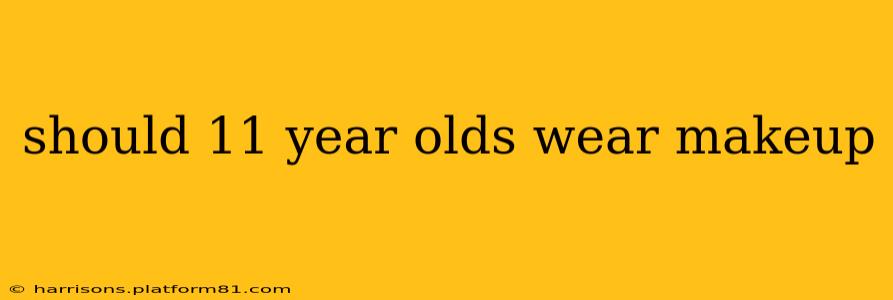Should 11-Year-Olds Wear Makeup? A Parent's Guide to Navigating the Tween Years
The question of whether 11-year-olds should wear makeup is a complex one, sparking debates among parents, educators, and even the tweens themselves. There's no single right answer, as the decision hinges on a variety of factors, including individual maturity, social context, and personal values. This guide aims to provide a balanced perspective, helping parents navigate this often-challenging conversation.
Understanding the Developmental Stage:
Eleven-year-olds are navigating a period of significant physical, emotional, and social change. Puberty is often underway, leading to shifts in body image and self-esteem. The desire to experiment with makeup can stem from a number of motivations, including:
- Self-expression: Makeup can be a tool for self-expression, allowing young people to explore their identity and personal style.
- Social pressure: Peer influence plays a significant role at this age, and the desire to fit in or emulate trends can be powerful.
- Increased self-awareness: As tweens become more aware of their appearance, they may seek ways to enhance or modify it.
The Potential Downsides of Early Makeup Use:
While makeup can be a form of self-expression, there are potential downsides to consider:
- Premature focus on appearance: Overemphasis on makeup can shift the focus away from other aspects of development, such as academics, friendships, and hobbies.
- Skin sensitivity: Many makeup products contain chemicals that can irritate sensitive skin, potentially leading to breakouts or allergic reactions.
- Unrealistic beauty standards: The heavily filtered and edited images prevalent in social media can create unrealistic beauty standards, impacting self-esteem and body image.
- Distraction from other important activities: Applying makeup can be time-consuming, potentially taking away from study time, extracurricular activities, or family time.
What are the concerns about allowing 11-year-olds to wear makeup?
Concerns about allowing 11-year-olds to wear makeup often center around the potential for premature focus on appearance, negative impacts on self-esteem due to unrealistic beauty standards, and the potential for skin irritation from certain products. Parents worry that early makeup use can lead to unhealthy obsessions with physical appearance, overshadowing other aspects of their child's development.
At what age is it appropriate for children to start wearing makeup?
There's no magic age at which it's deemed appropriate for children to start wearing makeup. The decision should be based on individual maturity, social context, and parental guidance. Some parents might allow minimal makeup use for special occasions starting around age 12 or 13, while others may wait until their child is older. Open communication and setting clear boundaries are crucial.
How can I talk to my 11-year-old about makeup?
Open and honest communication is key. Avoid lecturing; instead, engage in a conversation. Ask your child why they want to wear makeup. Listen to their reasons, addressing their concerns and anxieties. Explain the potential downsides, focusing on healthy skin habits and the importance of self-acceptance.
What are some alternatives to makeup?
Alternatives to makeup can include focusing on healthy skin habits like proper cleansing and moisturizing, experimenting with hair styling, or exploring other forms of self-expression like fashion or creative hobbies. Encourage your child to find ways to express themselves that don't solely rely on cosmetics.
A Collaborative Approach:
The best approach involves a collaborative effort between parent and child. Open communication, clear boundaries, and a focus on healthy self-esteem are crucial. If your 11-year-old expresses a strong desire to wear makeup, consider starting with minimal products and focusing on natural looks. Teach them proper application techniques and the importance of skincare. Most importantly, emphasize that true beauty goes far beyond cosmetics. By fostering a healthy relationship with their appearance, you can empower your child to navigate the tween years with confidence and self-assurance.
